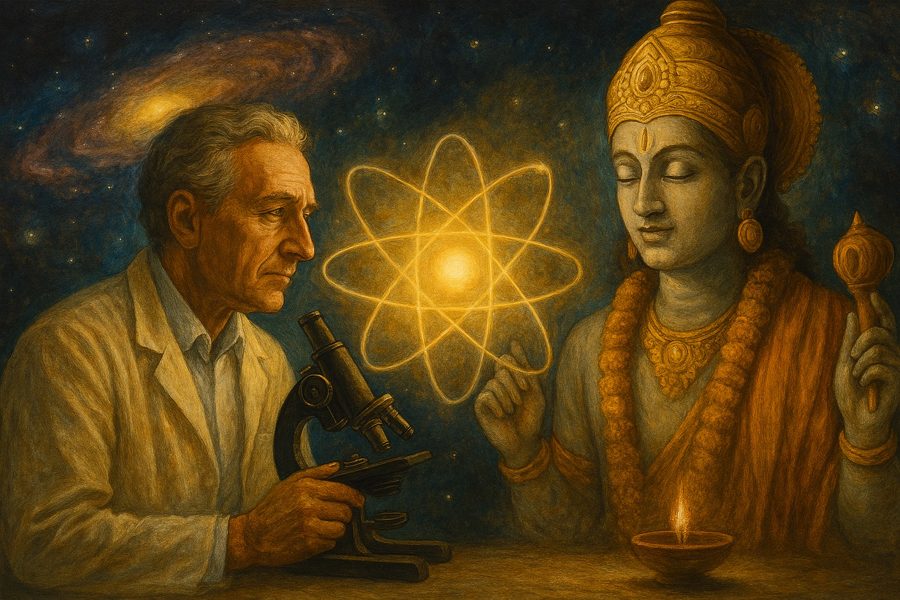The relationship between science and God has always sparked curiosity, debate, and reflection. While science focuses on facts, evidence, and natural laws, the concept of God belongs to faith, spirituality, and philosophy. For centuries, people have wondered whether scientific discoveries support or challenge the idea of divine power. Interestingly, many great scientists saw no contradiction between their work and belief in a higher force. This article explores the connection between science and God in eight detailed points, covering history, philosophy, scientific perspectives, and spirituality, helping readers understand how these two powerful domains often complement one another.
Science Explains “How,” Religion Explains “Why”
Science is dedicated to answering the question of how the universe functions. Through observation, experiments, and evidence-based theories, it explains natural phenomena such as gravity, evolution, and the Big Bang. Religion and spirituality, on the other hand, aim to answer the question of why the universe exists. Why is there life? What is the purpose of creation? These questions often go beyond the measurable world and enter the realm of faith. Many philosophers and scientists argue that science and religion are not opposites but complementary. While science provides clarity about processes, faith provides meaning. For example, while science explains how rain forms, religion might see rain as a blessing or divine grace. This perspective helps us understand that science and belief in God address different dimensions of human curiosity, and both play an important role in shaping our worldview.
Historical Clash Between Science and Faith
History is filled with instances where science and religion clashed. For example, Galileo was persecuted for supporting the heliocentric model, which went against Church teachings. Similarly, Charles Darwin’s theory of evolution was initially rejected by many religious authorities who believed it contradicted creation stories. These conflicts made people assume science and God are always at odds. However, over time, many of these clashes transformed into dialogues. Today, even though debates remain, a large number of scientists and theologians seek common ground. The historical clashes remind us that science challenges old ideas to expand knowledge, while religion preserves traditions that provide meaning. Instead of being enemies, both are different ways of seeking truth. Recognizing these conflicts helps us appreciate how humanity’s understanding of God and the universe has evolved over centuries, creating space for a more balanced perspective today.
Great Scientists and Their Views on God
Many brilliant scientists have expressed their belief in a higher power. Isaac Newton, who discovered the law of gravity, often referred to God as the creator of order in the universe. Albert Einstein, although not religious in a traditional sense, spoke of a “cosmic intelligence” and said, “God does not play dice with the universe.” Louis Pasteur, the father of microbiology, believed that science deepened his faith in God. These examples show that belief in God is not necessarily unscientific. For many scientists, their discoveries only increased their sense of wonder about the universe. Their work revealed such complexity and beauty that they saw it as evidence of intelligent design. Understanding these perspectives highlights that science and faith can coexist, and in some cases, scientific discovery may even strengthen belief in divine power rather than diminish it.
The Limits of Science and the Role of Faith
Science is powerful, but it has limits. It can measure, observe, and predict, but it cannot explain everything. Questions like “Why do we exist?” or “What happens after death?” lie outside the scope of scientific inquiry. These are areas where faith, philosophy, and spirituality step in. For instance, science can explain the biological processes of life, but the meaning of life is a spiritual question. Similarly, science can analyze the brain, but understanding consciousness and the soul often requires faith. Accepting the limits of science does not make it weaker; instead, it makes us realize the complementary role of belief. Faith answers the unmeasurable, offering comfort, hope, and purpose in ways science cannot. This shows that belief in God or divine power continues to play a role in human life, even in an age dominated by technology and scientific advancement.
The Universe as Evidence of Intelligent Design
The vastness and order of the universe often make people believe in a higher intelligence. The fine-tuning of natural laws, the perfect balance of forces, and the complexity of life raise questions that science alone struggles to explain. For example, the gravitational constant or the exact distance of Earth from the Sun make life possible. Many scientists and philosophers argue this precision is unlikely to be a coincidence. This perspective is often called the “intelligent design” argument. While some scientists attribute this to natural selection and chance, others see it as evidence of divine planning. Regardless of the stance, the universe inspires awe, and many people feel that such perfection reflects God’s power. This idea bridges science and faith, as both attempt to understand the extraordinary order that makes life and existence possible. The harmony of creation continues to fascinate thinkers worldwide.
Science Inspires Spiritual Wonder
Even when scientists are not religious, their discoveries often inspire deep spiritual wonder. Exploring the cosmos, unlocking the DNA code, or understanding quantum physics fills humanity with awe about existence. This sense of wonder often leads people to spiritual reflection. For example, when astronomers look at galaxies billions of light years away, they realize how small yet significant human life is. Such realizations can feel almost spiritual, even for non-believers. Science, therefore, does not always diminish faith-it sometimes strengthens it indirectly by highlighting the mystery of existence. For many, scientific wonder and spiritual faith go hand in hand, fueling curiosity and reverence together. The pursuit of knowledge often leads to humility, reminding us that the universe is larger than human understanding. This overlap between awe and belief shows that science and God are not enemies, but both can nurture the human soul.
Modern Dialogues Between Science and Religion
In today’s world, there is growing dialogue between scientists and religious leaders. Institutions like the Vatican Observatory or organizations promoting “science and faith dialogue” show that cooperation is possible. The Dalai Lama, for instance, openly supports scientific research while maintaining his spiritual traditions. Similarly, many scientists participate in interfaith discussions to explore how science and spirituality can work together. These dialogues emphasize ethics, human responsibility, and care for the planet-areas where both science and religion can contribute. For example, environmental challenges like climate change require both scientific solutions and moral responsibility. By working together, science and faith can guide humanity toward a better future. This modern interaction demonstrates that science and belief in God are not mutually exclusive. Instead, they can collaborate, blending knowledge with wisdom, reason with compassion, and facts with values to address humanity’s greatest challenges.
Science and God: Complementary Paths to Truth
At their core, both science and faith are human attempts to understand truth. Science does this by observing, experimenting, and reasoning, while faith does it by trusting in divine wisdom and purpose. Together, they provide a more complete picture of reality. For instance, science helps us understand the mechanics of the human body, while faith provides moral guidance on how to live. The two are not in competition but in harmony, each filling gaps left by the other. Just as two eyes provide depth to vision, science and spirituality together give depth to understanding life. Belief in God’s power does not diminish scientific progress; instead, it can inspire responsible use of knowledge. The future of humanity may depend on balancing the rational clarity of science with the moral and spiritual wisdom of faith. This complementary approach unites reason and belief in the search for truth.
Also Read-Why Do People Cheat? 8 Scientific Reasons Explained
Disclaimer: The articles, videos, and news published and shared on Theconnect24.com covering topics such as religion, astrology, health, yoga, history, mythology, and others are intended solely for general informational purposes. These materials are sourced from various references, and Theconnect24.com does not guarantee or verify their accuracy, completeness, or authenticity. Viewers are strongly advised to seek guidance from qualified experts or specialists before practicing, following, or experimenting with any information related to astrology, health, or similar subjects. This content is presented purely for the interest of viewers and does not carry any scientific validation or evidence.



